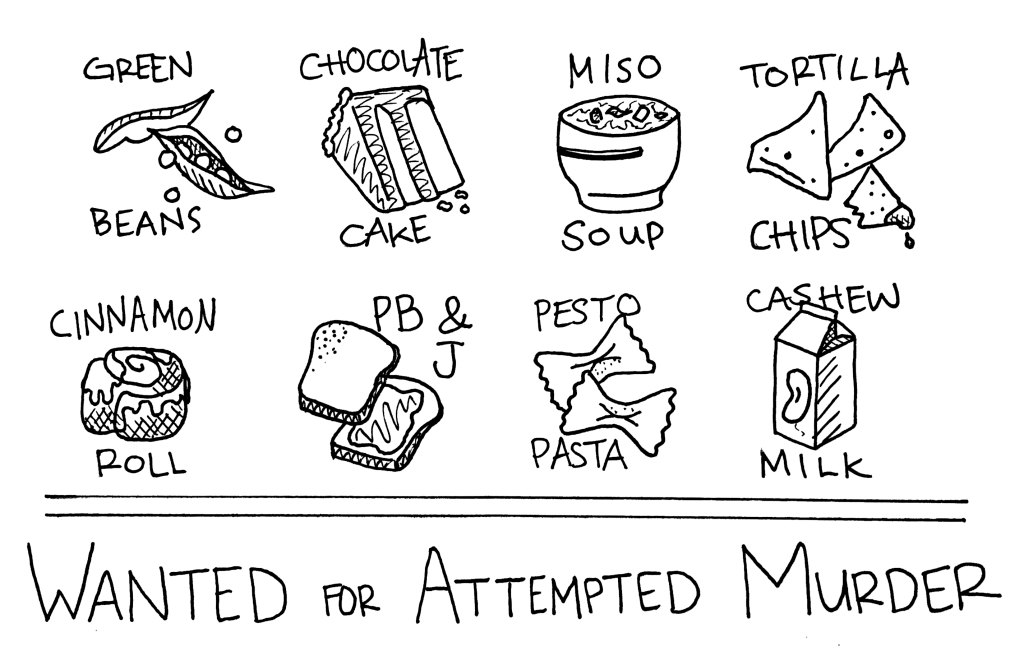Don’t drive me nuts
March 8, 2017

Living with food allergies can be terrifying, especially when they aren’t taken seriously
“But, it’s not like you’re going to die, right?” The barista stared at me suspiciously, picking out a mug for the latte I had just ordered. She looked over her shoulder to where her co-worker had gone into the kitchen to ask if the pumpkin bread was made with nuts. I ground the heel of my shoe against the floor.
“Yeah. I could die.”
She didn’t respond. After several minutes of tense silence, her co-worker returned.
“The kitchen says they’re pretty sure there aren’t any almonds. But it’s not like you’re going to die, right?”
In the early hours of New Year’s Day, only two weeks before my 13th birthday, I lay in a hospital bed thinking, “Yeah. I could die.” This summer, throwing up into a swampy porta-potty I thought, “Yeah, I could die.” One month ago I leaned against the doorframe to my bedroom, feeling my heart freeze up in my chest. Yeah. I could die.
At 7 years old I was told by my allergist not to worry, that my allergies would fade with time, that once I was older I would be able to eat almonds by the fistful. My body, however, had other ideas. When I was 11, I ate an almond chocolate and had my first experience with anaphylaxis, and this year I discovered that I had developed an allergy to tuna, a food which I have loved since I was a toddler.
Now that I’m 17 years old, I have episodes of anaphylaxis every time I accidentally eat tuna or almonds (including almond oil, flour, extract, butter or milk). My symptoms vary depending on the amount of food that I eat, but nausea, vomiting, tongue, cheek and throat swelling, mental confusion, nasal congestion, hives and low blood pressure are typical. When this happens, I have to stick myself in the thigh with an EpiPen, which is a spring-loaded shot of epinephrine. These shots can have side effects including dizziness, rapid heart rate, weakness and anxiety.
Avoiding tuna has been easy enough, but almonds are far harder to detect, possibly hiding in any food you can imagine, from green beans (the summer of 2013) to a peanut butter and jelly sandwich (newspaper UIL 2016). So every time a waiter or cashier gives me a not-so-thinly-veiled look of annoyance when I ask them to check ingredients, it’s hard to not grind my teeth in anger. What is annoying to them is potentially lethal to me.
Living with serious food allergies doesn’t have to be hard—all I really need to do is remember to check ingredients and have enough self control to reject food that I don’t know the origin of (which can be difficult, I mean, who wants to turn down nice, homemade baked goods?) My job, however, is made harder when people around me don’t know how to handle my allergies. To be fair, when I was younger I kept the secret of my allergies close to me, afraid to be seen as an inconvenience to restaurant servers, teachers or the parents of my friends. Now, after multiple reactions that could have been easily avoided, I no longer mind if I’m seen as a bother because I know that speaking up could save my life.
Here are some things you can do to help people with food allergies avoid reactions as well as give them some piece of mind.
Label food. If you’re having a party or a gathering and you bring food which does not come with an ingredient list, just put little notes on the containers, like “This has nuts.” or “Dairy-free.” I have had more reactions at parties and at social gatherings than anywhere else.
Don’t offer a friend with food allergies something unless you’re sure it’s safe. Several times I’ve taken food that was offered to me so as not to seem rude only to discover the food had almonds in it.
Ask them questions. Some people only have reactions if they ingest their allergens (like me), but other people can have reactions from something as simple as sitting next to their allergen. If you know a friend has an allergy, ask them specifically what you can and cannot eat around them.
Be accommodating. For example, some restaurants cook most of their food in peanut oil, so people with peanut allergies just can’t go there. It can be embarrassing to tell someone, especially someone you don’t know that well, that they have to change their plans because you have an allergy. Stay positive, you don’t want your friends to feel like they’re a burden.
Don’t lecture them—too much. After I’ve had a reaction is probably the worst time to tell me how I wasn’t being careful enough. Trust me, it’s a lesson that’s been learned the hard way. But if your friend truly is being careless about checking for their allergens, it’s OK to tell them, “Hey, I don’t want you to die. ”
Trust that someone’s allergy is as serious as they tell you. I don’t want to hear, “It’s not like you’re going to die, right?”



